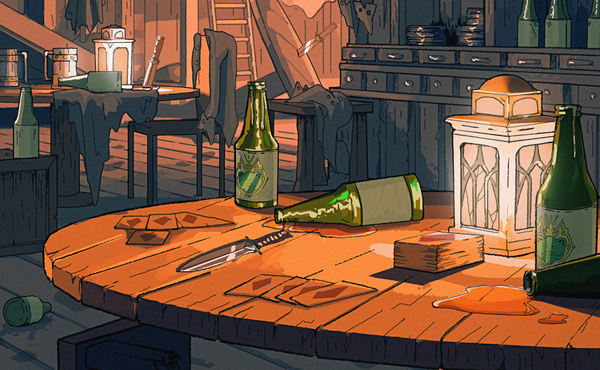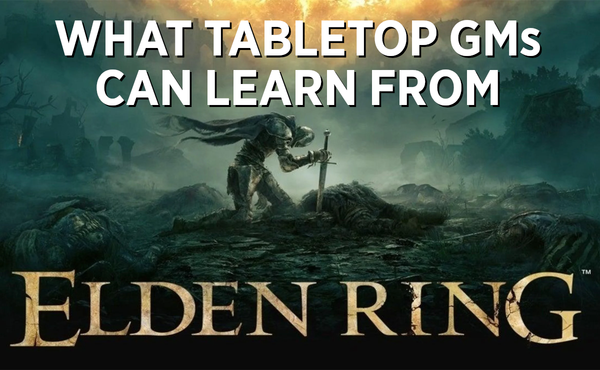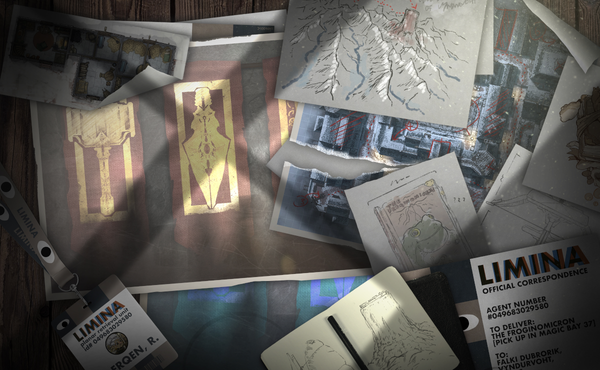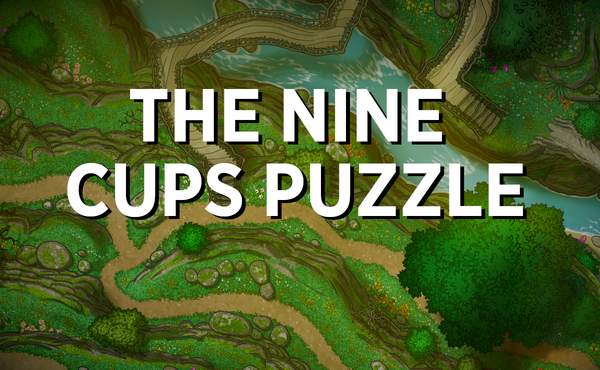The Loop Builds Its Own Structure - Interview with Ian Fisher of Tabletop RPG Music
A conversation with tabletop composer Ian Fisher about musical structure, VTT audio, and our composer community.
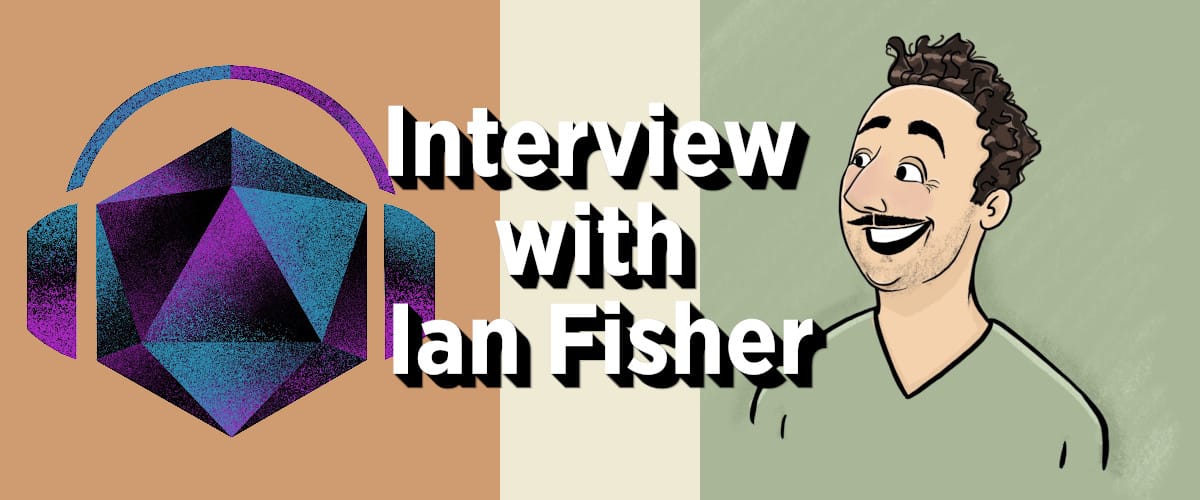
I sat down with my buddy and peer Ian Fisher, AKA Tabletop RPG Music, to chat about... well, tabletop RPG music. Ian is a prolific composer who has written dozens of albums worth of original tunes for you to use in your tabletop campaigns. He had a lot to say about music for VTTs, structure in tabletop music, the "epic music" genre, and the wider community to which he and I belong.
Ian is on all o' them streaming platforms, but do give his Patreon a look if you want access to his whole library. I'll pepper this post with links to specific tracks of his as well!
Will Savino: When I write fantasy music for tabletop games, I operate with a couple rules. I don't want there to be lyrics—comprehensible lyrics—because that's going to be distracting at the table. I don't want there to be super huge swings in volume between sections, because again, that would be distracting to folks. And broadly, a given track should mostly be about one theme. It shouldn't be peaceful in one section and combat in another.
I would think you probably do most of that stuff, too. Do you have any other rules that you use to help you compose?
Ian Fisher: Part of it is letting myself go outside of those rules sometimes. I'll sometimes do tracks that I think of more as themes. Often that comes from a Patreon request. So I'll do a track where someone's like, "I want an awesome Lord of the Rings prologue-style track." And that prologue goes all over the place. There are big battles and sinister music and all kinds of stuff, and so I've got to write something that fits that. And that is therefore going to be one that is going to have a very niche use at the table.
In general, I think the same kind of tone from beginning to end—with some slight variations just to allow for the sense of things moving—but still broadly on the same theme.
And then I think one thing that is interesting with music that is usually going to be looped is you can rely on a melody being heard multiple times when it's looped, and so you don't always have to make sure that every new melody that you establish is one that already comes from earlier in the track. So if it's two minutes into the track, and you want a new melody to come in, you don't have to worry too much about not having already established that in the first minute of the track. But even so, the same kind of vibe, the same theme, similar instrumentation. You don't want to surprise anyone at the table. So if a track starts, and it has a sci-fi vibe, you don't want a Shire whistle suddenly coming in two minutes in, unless it's got loads of reverb and distortion on it.
Yeah, I’m trying to think of any other specific rules that I have, because I think the things that you've said cover it pretty well. I have done one track with lyrics, but it was a joke track.
Will Savino: I love that one.
Ian Fisher: Me too.
Will Savino: You shouldn't have brought it up so early, because now it's going to be the first link that I post in this interview.
This is the stupidest goddamn song on the internet.
Ian Fisher: Oh no. That's terrible. Oh, I better think of a really good track I've written and mention that instead. Hah, no, go for it.
[laughs]
Yeah, I did that one. And that was great fun, but it's the sort of thing where it really needs to be used in a very specific context. Someone, you know, has used that track as part of their Waterdeep: Dragon Heist campaign, because they wanted to show an inn and give the players a little welcome into the tavern with this dumb song.
Knowing when to go outside of those rules is something that I think is important. If a track is really taking me as in a specific direction, I have enough content out there these days that I can afford to take a few risks every now and then and do a track that doesn't follow that formula and just label it and say, “listen, this is a theme. This is to be used at a specific moment.”
So I have a track that is called “The Countdown,” and it's a five minute track that gets faster and faster and faster in tempo. That was a specific request from someone on Patreon because they wanted a track that would be for a trap going off, and they wanted the music to be essentially equivalent to putting down a sand timer.
Will Savino: It's a really cool track, but you really can't loop it. I mean, you know, it's not a Shepard tone, it's not constantly rising tension. If you loop it, you just suddenly end up back at the start, and it's like, “oh, I guess we're fine again for a little bit.”
But if you plan an entire encounter around it, and as a GM, you say, “when I press play, you have five minutes of real time or else the bomb goes off, or you get crushed to death, or whatever.” Like… that's amazing and that would be such a memorable experience for a table.
Ian Fisher: Yeah, but it's a one off. It’s a one-and-done kind of thing.
Will Savino: Yeah.
Ian Fisher: But yeah, I can't think of any specific other rules. I mean, you probably can guess from how I name my hard drives that I don't have much of an organized process when I write music. I think I've posted some of the images of my project files onto the little composer Discord that we have…
Will Savino: It’s devastating.
Ian Fisher: Yeah, nothing is labeled, the colors are all over the place, nothing makes sense. I have to just try and sustain that chaos long enough to have a three minute-ish track before all of that exits my brain again. There is no template.
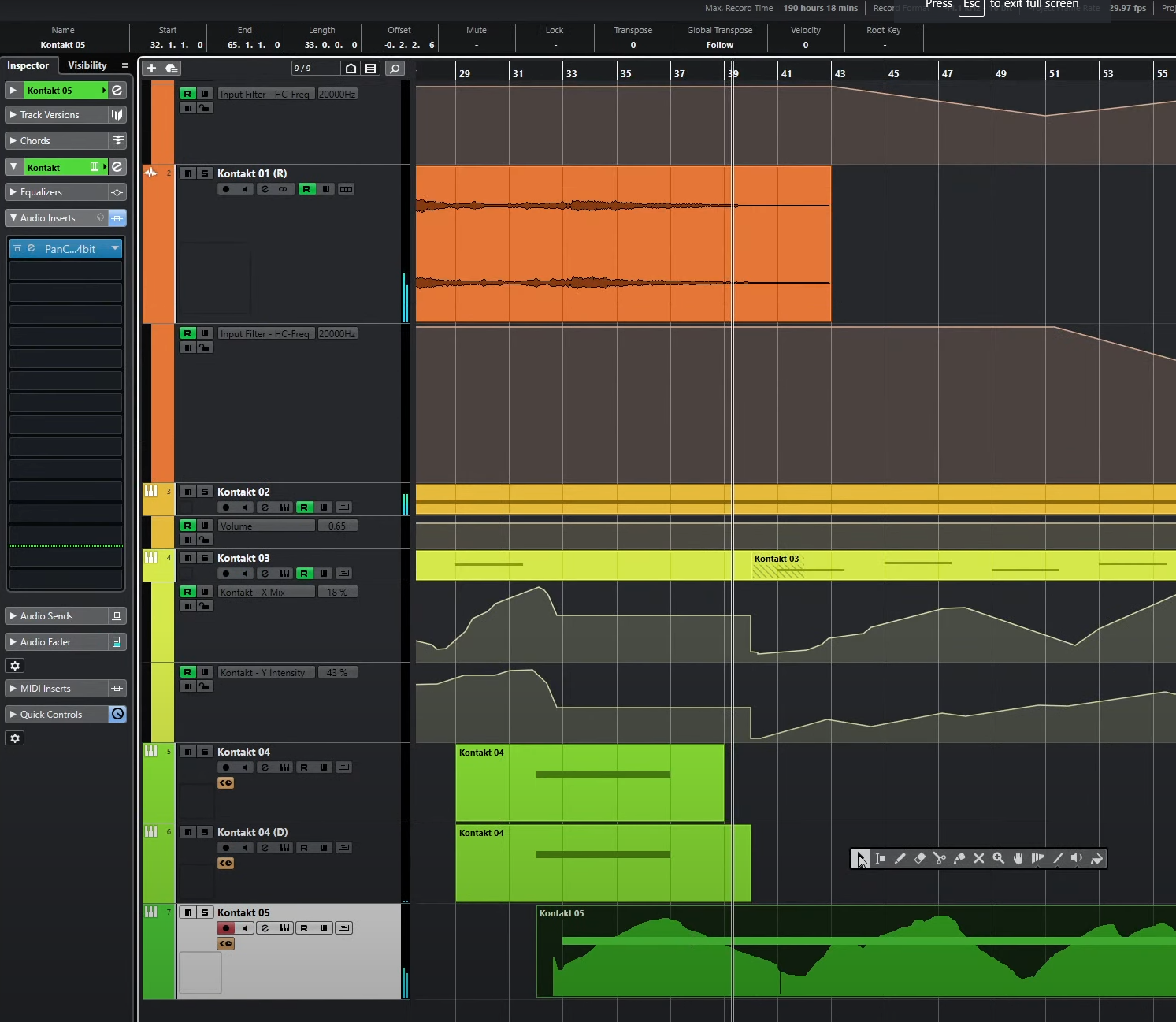
Will Savino: Well, I've watched your livestreams plenty, your composing streams, and despite the fact that you are going to hell for your failure to have any sense of organization whatsoever, I think that—aside from that—you and I have pretty similar compositional styles or approaches in that it seems from the outside very improvisatory, right? “Oh, let me try this instrument. Yeah, that's kind of a cool sound. Let's just record that and start from there.”
Ian Fisher: Yeah.
Will Savino: I have this dumb belief that all composition is improvisation, just with edits. You know, all composition has to start from somewhere, and that's always going to be, “well I've never done this before.”
It's fun watching you really just go, “oh yeah I bought this sample pack, let me noodle around on these sounds, ooh, that needs some cool effect”—and you slap an effect on. You know, it's not structured, you're not saying “okay, for this one, we're going to try to do a sonata form here.” It’s nothing like that. I mean, it's truly higgledy-piggledy, but again, because it's looped, I don't think structure, in any sort of classical sense, is very important for what we do.
Ian Fisher: The loop builds its own structure.
Will Savino: Right, exactly. When the GM decides to either switch tracks halfway through or listen to it five times in a row, that's what determines the structure, not whatever you do in your audio workstation.
Ian Fisher: Yeah, exactly. If the track from beginning to end is consistent enough in tone and in vibes and instrumentation, then you're setting a tone that hopefully will exist in some background space where it will kind of be noticed but not too much.
And then the hope would be that you could find a bunch of tracks that have a similar vibe and just keep them playing for hours, or you could even have the same track looping and have it go on for hours, and the players won't get too bored of it.
Sometimes you want to add a bit of dramatic flair, and as the composer, you want to add something in that is going to be a bit more memorable. Combat tracks can be a bit more tricky to keep looping for an hour or something compared to a background track. And that's where you can have a bit more fun, have a few more highs and lows than you would with a standard atmospheric background track, as long as they're not insane highs versus super quiet lows.
Will Savino: But that is a genre! Music is a temporal medium, but the nature of scoring for tabletop means you have no idea what the time frame is going to be for the users. So it's really weird to be thinking in terms of like, “oh what we're doing is creating art that unfolds in time, but who knows how that's going to work for the end user.” So you kind of just have to make something that works regardless.
And there's this whole genre of “epic music,” you know, Two Steps From Hell, etc. Almost every track follows the exact same format which is that it starts off impossibly quietly with just a few little piano plinks, and then eventually it is BRAAAMs and impacts and war drums, until it just maxes out with spiccato strings going as loud as possible and horn blasts and whatnot. For my money, that's not good combat music for tabletop sessions because of those swings in intensity.
But then, when I really want to do epic music, you’ve kind of got two choices. You can either target maximum energy, and say, “it's going to be this literally for two to five minutes,” which is exhausting for the writer and for the listener. Or, you can say, “well it's going to start at 50% intensity and then it's going to get up to 90%.” And, it's all going to be intense and there's going to be variation, but that's exhausting too, and it also isn't technically epic the whole way through. It's a catch-22.
Ian Fisher: Yeah, I don't like that term “epic music,” it’s just become it’s own slightly meaningless genre.
Will Savino: But you know what I mean when I say…
Ian Fisher: I know exactly what you mean. Yeah, and I've written things like that before. One of my best performing non-tabletop tracks was just a stock music track that I did. That’s in that style, and it still makes me a little bit of money today, which is nice.
Yeah, I think ideally for a tabletop track, you want to imagine that you could start the track from anywhere in the track. So if it's a three minute track, you want to be able to write something where if someone started it two minutes in, it would still work as a track, looping back on itself or whatever. It doesn't need to have a structure which tells a narrative that is self-contained within a single play of the track.
Will Savino: Right. I think the exception there is those tracks that you label “themes” on Spotify and Patreon, because the idea is, “here's a specific character or a specific scene.” The idea is probably you'll play this track start to finish when that character is introduced, or whatever.
In my own sessions, I love having most of my playback be my own Spotify playlists, but every once in a while, I say, “well for this exact thing, I'm going to play one specific track exactly once and then move on.” I have no gauge at all as to how often other GMs do that. I think it's pretty much a spread from “press play on a playlist with 10,000 tracks and shuffle it and who cares, whatever comes up comes up,” versus, “I have a dedicated track for every single encounter that will happen in the next three hours.”
Ian Fisher: There's a GM that I am a player for, and I have been for many years. We're on, like, our fifth campaign now. He uses music really well. Tragically, doesn't use my music, which is outrageous.
Will Savino: [laughs]
Ian Fisher: Which I kind of respect him for, knowing me so well and not feeling socially embarrassed into using my music. He uses music very specifically tied to characters or to very specific themes in the campaign, less so the location, which is what I normally would do. It's worked really effectively in his games because, even to this day, I remember very specifically the track that was associated with a really meaningful moment or a meaningful set of scenes in that campaign, because it always went back to that same track. And whenever he came on, I would almost get shivers, because I'm like, “oh here we go. This character or this element is back.” That’s something I'd like to do more as a GM.
Honestly, I can write lots of tables of music, but it's a whole separate art to know when to trigger music, and at what time, and how much attention to pay to it. Ideally you don't want GMs have to spend loads and loads of their bandwidth that is very all over the place during a game on deciding what music is going to play, but a few key moments, and a few examples of, “okay, this character, when they're on screen, is going to have this theme, or this location is going to have this track that I always play first whenever the players enter.” It can really add a lot to how players remember a place or remember a person or remember a moment in the game.
Will Savino: I am… I'm not going to say lazy, but I don't like to be super prescriptive with my music choices when I'm GMing, in that I pretty much practice what I preach and straight up just use my own Spotify playlists. So if it's a calm moment, I press play on DnD Calm and basically don't think about it. Sometimes if I've heard too many of my own tracks in a row, I say “I'm sick of this,” and I fast forward my tunes. But other than that, I don't need to be super prescriptive.
But it is tricky having to make music for so many different types of play styles, so many different sorts of GMing and DJing philosophies. And now with what you're doing with Ember, this is basically untrod territory for tabletop gaming in general. Can you just describe a little bit about Ember and what it is and what you're doing for the music systems for it?

Ian Fisher: Ember is a huge D&D and Crucible—which is a system that's under development within Foundry—a huge kind of… the simplest way to think about it is as a digital campaign, but it is also a setting, a sandbox, and basically a way of running and playing in a D&D or general tabletop game that takes advantage of digital tools.
There's a whole events system that dictates, “when you are in this hex on this map, there is an x% chance that this event will occur depending on whether you have already done X, Y, Z.” There’s loads of amazing art and these custom vistas which are point-of-view, parallax scenes where you can drop characters in and things like that. It’s incredible, and I would really recommend everyone check it out, especially if you're someone who already uses virtual tabletops and is interested in that space.
But then the audio, in every way it's designed to be dynamic. So, for the environmental sound—because I also do the general sound for Ember, which is slightly scary, uncharted territory for me.
Will Savino: Haha, that sucks, man. I hate doing sound design.
Ian Fisher: Yeah, it's one of those things, where I'm like, “well I'm the audio guy, I know how this thing works. I better do that too.”
Will Savino: I hate to say this, but couldn't you have just told Andrew [the creator of Foundry and Ember] to ping [sound designer Michael] Ghelfi? Or did you really want this extra work on your plate?
[laughs]
Ian Fisher: That discussion was definitely had, and eventually it was like, “well we're going to do this whole dynamic thing for the music, let's also do it for the [additional] audio, and we don't need to hire another audio person, so you'll do it.”
And I'm like, “yeah, okay, fine.” [laughs]
Yeah, so the audio for Ember is all dynamically composed. So, that is split into multiple parts. I’ll talk about music because that's the thing I'm most interested in, and that's the thing that I find easiest to talk about with it. If you're in a location, you'll hear the music for that location. But let's say that the mood turns tense. Maybe the quest specifically is a quest that has some tense vibes. There is a “tension variant” of that location music that will automatically be switched to when you start that quest or when you get to a certain point in that quest. Then it will automatically switch back to the calm version when that quest is over… if it warrants the mood being calm again.
Same with the day/night cycle. So, if you transition from day to night, the music will automatically change from daytime to nighttime. If you enter into combat, it automatically switches to combat music and then back to regular when you leave combat.
But that's just scratching the surface, because the actual tracks themselves are written in layers. So, a track might be... let's say it's like... there’s a town called Helkas, and let's say the calm version, that [music] might be made of 15 to 20 layers, and only a certain number of them will play at a time. So we designate between four or six layers to play at one time. After the track has looped, we'll switch up the layers, and some of the layers will stay the same and some will change. So you have this continually evolving sound. It's still the same music in a sense, because it's all built on the same structure. But the Helkas calm track is actually just loads of separate audio layers that just kind of weave in and out as you remain in that mood and that location.
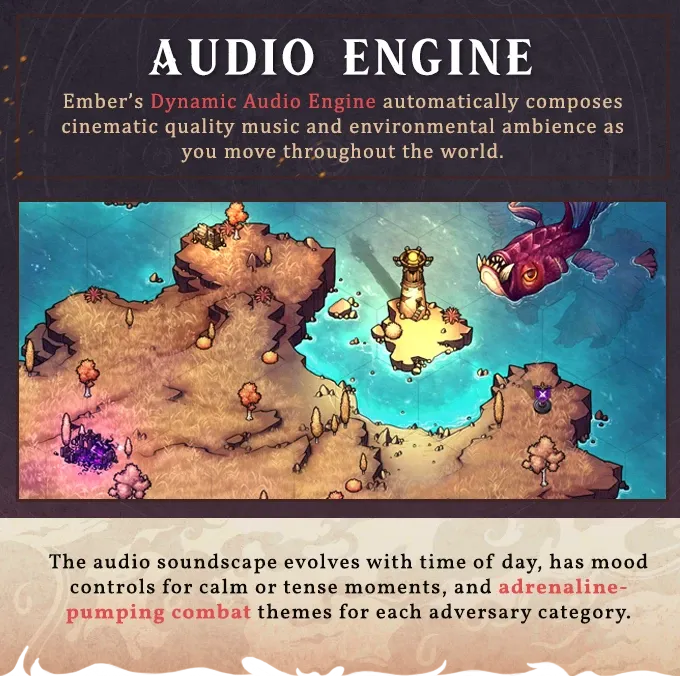
Will Savino: I mean, what you're describing is just video game music. It goes without saying that what this is, is that Ember is really blurring the lines between what is expected of a tabletop campaign/setting and the technology that people usually just fully associate with video games. And there are a few projects that blur these lines—Sunderfolk, I think it's called?—games that are 50% tabletop-y and 50% some sort of purely digital element.
But that's a wild thing to do, because I think you told me that you're not using any middleware and this is all just done directly in Foundry's Engine?
Ian Fisher: Yeah, Andrew—also known as Atropos online—who is the creator of Foundry, is a coding genius. I don't know how he ever sleeps, because he gets so much done in a day. He creates some really amazing things, like really mind-blowing. We’ve worked together on this. I've had lots of ideas and then he's had to figure out how to implement those ideas.
So through that process I've learned a little bit more about the mechanical side of it. I don't know how to code, necessarily, but there's a lot more that now I can do without having to go back to Andrew.
Will Savino: Have you scored a video game before?
Ian Fisher: Hmm, I’ve scored… Have I scored a video game before? Yeah, I've scored a few apps… like “app games” and stuff like that, but nothing too big, and nothing that has used this kind of a system.
I worked for a company that was working on a dynamic music style project before I got into tabletop music, so I have a bit of a history with writing music in layers like this, and it's something that appeals to me. I wouldn't want to do it for everything that I write, but it's quite entertaining and quite novel.
Will Savino: Even if you don't code, determining the logic for when what plays and how many layers should play and when to do transitions and how those transitions work, etc… that is a skill set in and of itself that, again, is normally reserved for people working in video games. So for this to work on a tabletop scale, and, for whatever reason, Andrew decided to implement his audio engine himself when really complex and powerful tools already exist…
If someone told me, “hey, can you make [the audio engine] for Foundry?” I'd be like, “can I please do it in FMOD instead? Please.”
[laughs]
Ian Fisher: Yeah, I know. I mean, I guess Foundry wouldn't exist without there being someone who's like, “there are all these existing things that do the thing, but I can do it better.” And that's basically the way Andrew thinks and I appreciate him for that. It's awesome to be able to dive into this project with him. It makes everything very efficient, as well. It's all done in a way that works just within Foundry and hopefully will then run without too much latency or any kind of issues with it slowing people's computers down and stuff.
Will Savino: This is such a small issue in the scheme of things, but it speaks to Andrew's skill and Foundry's technical robustness: almost every audio playback system on Earth has a hiccup when you try to loop a track, and it's maddening because seamlessly looping tracks just add so much immersion and Foundry just doesn't hiccup. It has just always worked perfectly since day one. That alone is a good argument in favor of using that for your VTT.
And I'm not paid by Andrew! He very specifically does not pay me!
Ian Fisher: Yeah, I think this might have been before I was working on Ember, but they were doing some changes with how the audio engine for Foundry works more generally. I just remember messaging him going, “hey, when you set a fade time—which is for the fade-in and fade-out of a track on Foundry—could you make it so that it doesn't implement that fade when the track loops?
And he's like, “yeah, that makes sense,” and then just changed it!
It was like, oh, hallelujah. Someone just listens to my problem with the audio and changed it for their massive piece of software. It was quite a nice moment of “okay, this is someone I can work with, I think.”
Will Savino: Okay, let's stop giving free publicity to Foundry for a second.
[laughs]
I want to compliment you on doing something that a lot of folks in this industry don't do, which is focusing so heavily on music track archetypes that are not very profitable and that don't get enough attention. We certainly have peers who maybe do the same types of tracks pretty regularly because they know that's the kind of thing that gets plays on YouTube or Spotify or whatever. Going through your library, you have these super niche themes that just make it so much easier for folks to actually score entire campaigns because, “oh, I got to fight with an astral dreadnought coming up.”
Well, guess what? Ian has a track for that.
Or, “I'm amongst epic heroes in some Norse long house.”
Well, brother, Ian's got you covered for that one, too.
Ian Fisher: Yeah. [laughs]
Will Savino: It's so nice, and unfortunately, I got to imagine that a lot of those have… uh, 200 plays on Spotify. But probably 50% of those were for people who were like, “thank god I finally found this track.”
Ian Fisher: Yeah, my best performing track…
Will Savino: It’s “Tavern Tune” probably, right? Or “Tavern Song” or whatever?
Ian Fisher Yeah, it's just called “Tavern Music.” And it makes me, like… 40% of my entire Spotify revenue, comes from that one track.
Will Savino: And people probably don't even necessarily know it. They're just searching “Tavern Song.” Right? It's probably 90% just good SEO. No offense.
Ian Fisher: Yeah, which is also why I chose the name “Tabletop RPG Music.”
Will Savino: It’s maddening. Tabletop RPG Music is a horrible name. I mean, it's it's exactly as bad as Music d20… but it's way better for SEO, which drives me crazy.
[laughs]
Ian Fisher: Yeah, yeah. There's no love in that name. Really, it was me being like, “I guess I'll try this thing. What should I call it? I guess I'll call it the thing that it is.”
I think your music and my music are similar, in that all our decisions we make when composing are similar in that we both like to do some stuff that's a bit more your standard fantasy or sci-fi fare, but we also like to get weird with our music and do stuff that excites us as composers.
From my perspective, my entire career has boiled down to… I stop working on the things that I don't enjoy working on. That that led me into being in quite a lot of debt before I started this project. But, on the plus side, it means that obviously I like writing more standard fantasy fare that might be more immediately profitable and streamable. But also, part of what I enjoy doing is sitting down and writing a track and going, “alright, I'm going to write something different to anything I've written before,” and I try to think in that way for most tracks.
So even if I then go back and write a tavern track, I will try to avoid using the same instruments.
I'll try to avoid using the same effects or the same structure as a different tavern track that I've done. I do fall quite often into slightly spacey mystical ambiences, so there are a few repeats in that genre because I enjoy it too much.
I think I've been surprised by the kind of music that people request, because I take requests from my Patreon supporters, and sometimes people request all kinds of weird stuff. I don't remember if “Astral Dreadnought” was something I chose or if that was someone's request, because everyone's campaigns go in really bizarre places. I can only think of my own campaigns and what weird situations we've ended up in! It's going to be impossible to have music that is perfect for every single moment, but it's nice to cover a wide range.
I'm very fortunate that I make decent money from this project, so I'm not worrying too much about trying to make the most profitable thing ever. I just hope that my passion and enthusiasm is on display through the music that comes out. That is to say, I certainly don’t think there’s anything wrong with that other approach, because people need to make money and also people can be just really great at writing a certain type of music, and if that's what they want to do, then absolutely go for it. I like to just go all over the place with what I write as much as I can.
Will Savino: But that's also why you've had the success that you have. I imagine a huge percentage of your Patreon supporters support you because your library encompasses such a wide range. So they know, “oh, I go give Ian a follow and I can be guaranteed that I have tracks for just about any possible scenario I could run into in my campaign.” That’s just a huge boon. If you have 100 “walking through elven fantasy forest” tracks, okay, this is great for 5% of my campaign, and it's probably the prettiest music in the genre. But what the hell am I supposed to do when I get into a goblin fight or I end up in outer space or I take some magic mushrooms, right?
Ian Fisher: Yeah.
Will Savino: And that's the kind of stuff that having a big enough library and well organized tracks—at least on the patron facing side.
Ian Fisher: Yeah, it's a mess behind the scenes, but I try and clear it up as best I can.
[laughs]
But yeah, having that library is… that's been a marathon rather than sprint. I didn't have that library when I started off, and it's taken a long time to build that. Now it's nice to have the reassurance of having a lot of tracks behind me, so I know that in general people can find roughly what they want. There's still loads of places where I feel like I've not got enough tracks of a certain style, but it's definitely reassuring to have that. For anyone starting out doing the same thing, it's going to take a while to have a big library like that. You just stick at it and enjoy the ride to get there. It's a little bit of a relief once that finally happens.
Will Savino: We both started in this industry around the same time. I think you launched in 2020 or 2019?
Ian Fisher: It was near the start of COVID, so I guess it would have been 2020. Well, I did some fantasy stuff before then that was based on Critical Role. That would be in 2019 or 18 probably. So then the actual project, this Patreon thing was 2020.
Will Savino: We both started out, and I feel like we both targeted a similar goal, which was having a comprehensive library, so that if someone were to subscribe to us, they'd literally be able to score a whole campaign with our music. And, in 2025, we've both basically succeeded… that's just pretty amazing!
It's a cool place to be in, especially because—I'm not trying to advertise myself during my interview with you! [laughs]—but if someone were to subscribe to both of us, I mean, they'd have two options for any possible encounter that they'd want, and I think that's beautiful.
Ian Fisher: Yeah, hopefully at least two!
Will Savino: I'm really thankful that the industry has turned out the way it has, where we both can make a living making music that we love, and we both have such awesome supporters. And the fact that I can pay rent with music, and that you can—apparently—live in London with music…
Ian Fisher: [laughs] Somehow, yeah!
Will Savino: What a lucky life we've both stumbled into!
Ian Fisher: I know. I know. Listen, I lived in some weird places in London for the first few years. It wasn't all luxury.
And also, I think it's not an accident that we're in a position where we both—and other people as well—can have success doing this and not feel like we're canceling each other out. One thing that I really respect about you, Will—not to force you to write more nice things about yourself on your blog, but you need to!—but you've been amazing as a supporter of people doing this same thing that we’re doing.
You put some of my tracks quite high on your Spotify playlist that have managed to take me out of the “Low Followers / Low Streams Zone” into something a little bit more exciting. And also, we have this little Discord with a bunch of folks who do tabletop music. I've become more and more of a lurker on there just because I don't have time, and I'm sure you're probably starting to feel the same thing now that we’re both parents, but you've you've been fantastic for helping other people and sharing your feedback and thoughts.
I love that we're niche enough and small enough that you would have thought maybe there'd be quite fierce competition between all these folks, but actually, it feels like we're all trying to lift one another up in this. There aren't that many places where you can do awesome creative stuff and make money from it. It's not going to work out for everyone, but it's nice that we're in positions where we feel like we can help other people as well.
Will Savino: First of all, thank you. Very kind of you to say all that. I feel like we are so lucky to, first of all, be in a community—like, the broader tabletop community—which is kind and uplifting and by far the least toxic fandom I can think of.
But also, just on a purely factual basis: we literally aren't competitors, right? If someone were to find out, “oh, shit, there are two people who have fully comprehensive massive libraries of tracks for me to use in my campaigns? Dope. I'm going to subscribe to both of them.” I think that that is the overwhelming sentiment.
It's not, “dang, I got to choose between them.” I mean, obviously, people on a budget will choose one or the other, but I think we only benefit from having such a strong community. And, you know, we've been talking about each other this whole time, but I could list everyone in the community, which I have over the years.
I feel so grateful that we've got such great pals and that—with a few notable outliers who are obviously not in our Discord—no one treats this as a zero-sum game. Lifting up the dedicated tabletop RPG composer community—which seems so niche!—has just been such a blessing for all of us, and the fact that there are, probably like… 10 people in the world who have that specific title and are able to make a full-time living when it was literally one 10 years ago (shout out, Tim), like… that rocks. That rocks that it's that many.
OK, let's wrap this up. What do you need to plug? I mean, I will obviously plug your Patreon, your Spotify, your—24? 23?—full-length albums that you've got out now.
Ian Fisher: [laughs] Oh, I don't know. I've lost count. Yeah.
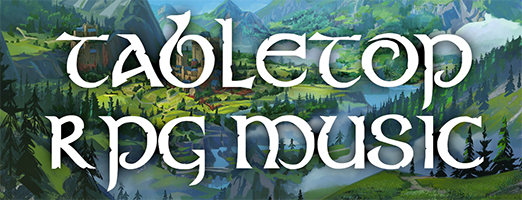
Will Savino: Anything else coming up on the horizon that you want folks to pay attention to?
Ian Fisher: I should have the City of Mist: Local Legends soundtrack out sometime soon. I'm just waiting for confirmation that I can get that posted, and then I'm going to be working on the Legend in the Mist soundtrack. I love the City of Mist system, and so I'm really excited to working on that.
So that's not really a plug for me because…. those things don't exist yet. But I'm excited that they will at some point exist.
But yeah, my website, my Foundry module, my Patreon. That's where I'm at. I don't really do much social media, but I have a Discord server which is free for anyone to join. That’s where folks can find me, and I take track requests from folks who support me on Patreon. And the usual: loads of tracks, standard versions, alternate versions that take the same track and put them in an entirely different direction.
Will Savino: The same business model the rest of us all have.
Ian Fisher: Yeah, exactly. But yeah, I can't think of anywhere else I require to be plugged. [laughs] That’s pretty good!

